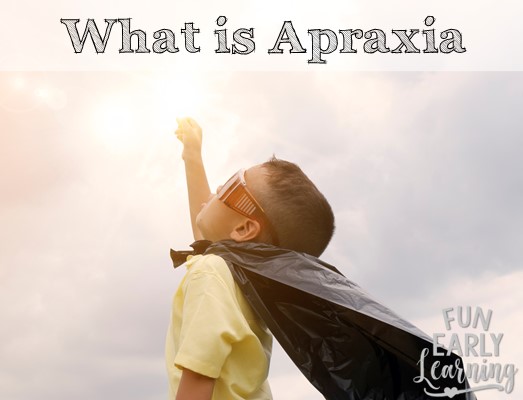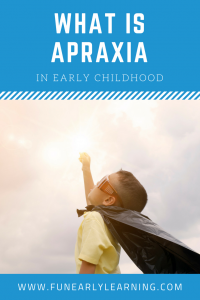
As a parent you know your child best. You may have a feeling that there is something wrong with their speech. They may have difficulty speaking, saying sounds and words. You may be able to understand some of what they say as their parent, but do others struggle to understand them? Perhaps you’ve taken your child to a doctor or speech language pathologist (SLP) who told you that your child has apraxia. What exactly is Childhood Apraxia of Speech?
About Childhood Apraxia of Speech
Childhood Apraxia of Speech is a motor speech disorder that makes it difficult for children to speak. They know what they want to say, but they have a very difficult time verbalizing it. It can take a lot of practice, time, and patience to learn to say sounds and words better.
When we speak, our brain sends messages to our mouth. These messages tell our muscles how to move and make sounds/words. Childhood Apraxia of Speech is when these messages get interrupted and cause children to struggle to speak. They know what they want to say, they can cognitively understand language, but they struggle to get their mouth to make sounds they want to say.
To overcome apraxia, your child’s brain needs to learn how to send messages to their speech muscles to form proper sounds and words. This is not always easy and quick to do. For many children, it takes a lot of practice and repetition. It can take a speech pathologist and a parent working together to help your child learn to speak properly at a normal speed and rhythm.
Symptoms of Childhood Apraxia of Speech
Not all children with apraxia are the same. Some children will have mild apraxia, while others are quite severe. The most common symptoms of apraxia are:
-
Talks Later
- Your child doesn’t coo or babble as an infant
- Begin speaking / says their first word late
- Says very few sounds / has trouble making sounds
- Has long pauses between sounds or words
-
Groping Movement
- Your child struggles to move their tongue, lips or jaw to make sounds or words
-
Problems Imitating
- Difficulty imitating what others say
-
Reduced Speech Intelligibility
- Difficult for others to understand
If you’re concerned that your child is showing signs of Childhood Apraxia of Speech, it is important to be evaluated by a speech language pathologist (SLP) as soon as possible. They will be able to determine if your child has apraxia, and what treatment they will need. With the right type of intervention, many children can become intelligible speakers. It just takes time, commitment, and consistent treatment.

References
- American Speech-Language-Hearing Association – Childhood Apraxia of Speech
- Mayo Clinic – Childhood Apraxia of Speech
- The Asha Leader Blog – 10 Early Signs and Symptoms of Childhood Apraxia of Speech
- Mommy Speech Therapy – What is Apraxia
- Merriam-Webster – Definition of Apraxia
- Web MD – Apraxia: Symtpoms, Causes, Tests, Treatment

